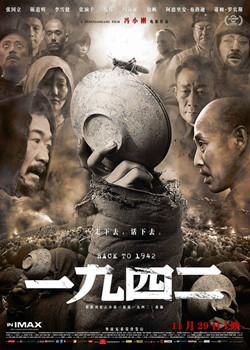
 |
| Poster of "Back to 1942" |
Feng Xiaogang's new film "Back to 1942" made its world premiere during the 7th edition of the Rome International Film Festival on November 9-17.
The festival's artistic director, Marco Mueller, is an Italian Sinologist who studied in Mao's China during the late 1970s before starting his career in cinema. He is one of the first to have introduced Chinese cinema to Western audiences. It is not by chance, then, that both surprise films to have premiered at the festival in Rome were Chinese. Johnnie To's "Drug War" (the first film the Hong Kong maestro shot in China's mainland) became the second Chinese feature to be screened alongside Feng's new film.
Born in 1958, Feng Xiaogang is most renowned for his output in the "hesuipian" genre, literally translating as "Chinese New Year film", a very popular kind of film among Chinese audiences. Hesuipian movies are characterised by their high production value, an extra eye for detail and articulated narratives.
Possibly the most acclaimed filmmaker of the genre, Feng enjoys mass popularity in China. Unlike his previous works, "Back to 1942" is the first film that does not take place in contemporary China. The film is set in the titular year shortly before the end of the second Sino-Japanese war which will end with general Chiang Kai-shek's retreat to Taiwan and Mao's victory in 1949.
A locust invasion, drought and governmental inadequacy, as well as the transfer of significant amounts of food produce aimed at countering the Japanese invasion lead to a famine of colossal proportions in Henan province from 1942 to at least 1943. The film describes the quasi-biblical exodus of the Yanjin County inhabitants toward the Shaanxi area in their desperate search for food.
Fan, a rich if goofy landlord, and his family live in a fortified mansion around which the village life revolves. That is until bandits assault the village, forcing them along with their fellow villagers to flee the violence and search for food. As time goes by, their helpless journey is plagued by hunger, Japanese bombardments and internecine struggles.
Instead of helping the civilians, the Chinese national army takes advantage of the chaotic situation to loot and so does a catholic priest who preaches his credo in-between bombardments. Acts of cannibalism even take place amongst the increasingly despondent group of refugees, who have been left helpless by their government as well as by nature.
Too busy thinking about the political situation, government officials fail to realize the gravity of the problem in Yanjin County that keeps worsening with the passing of time. Li Peiji, the governor of the Henan Province, is unable to communicate the factual dimension of the famine to general Chiang Kai-shek, who seems too concerned with the war to care about its consequences. Clearly, in the corridors of power, the people of Yanjin County are just another pawn to be moved on the geopolitical map.
The film and its director are clearly concerned with the human suffering which occurred in Yanjin, the cruelty of which is amply documented and granted a generous dose of empathy. Even so, the film fails to make the spectators feel any of it. Theodore White (played by Adrian Brody), a Time Magazine journalist who brings the famine to international attention with his photographs, tries to convince officials of the gravity of the crisis (Brody is not the only Hollywood actor appearing in the film, Tim Robbins also delivers a poor performance as an improbable monk offering temporary relief to his compatriot).















 Solar yacht put into use in SE China
Solar yacht put into use in SE China


![]()
